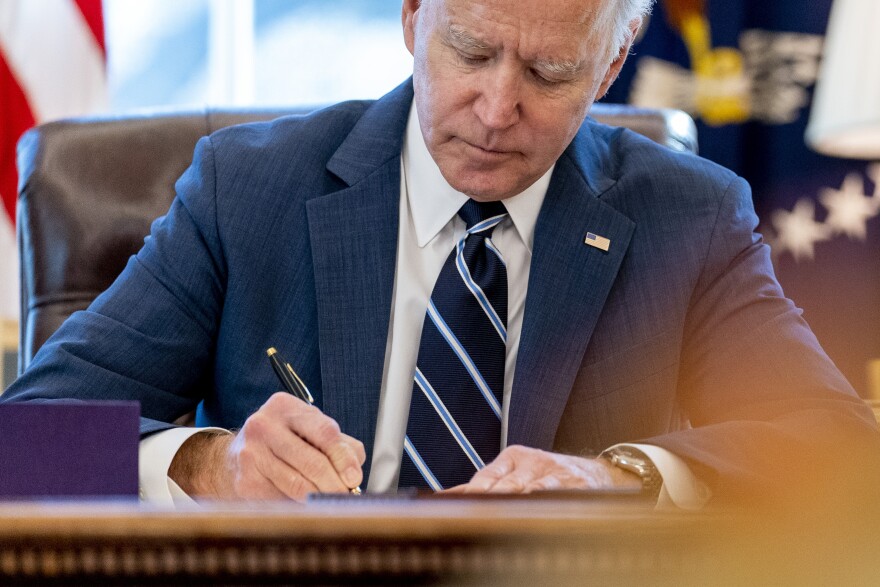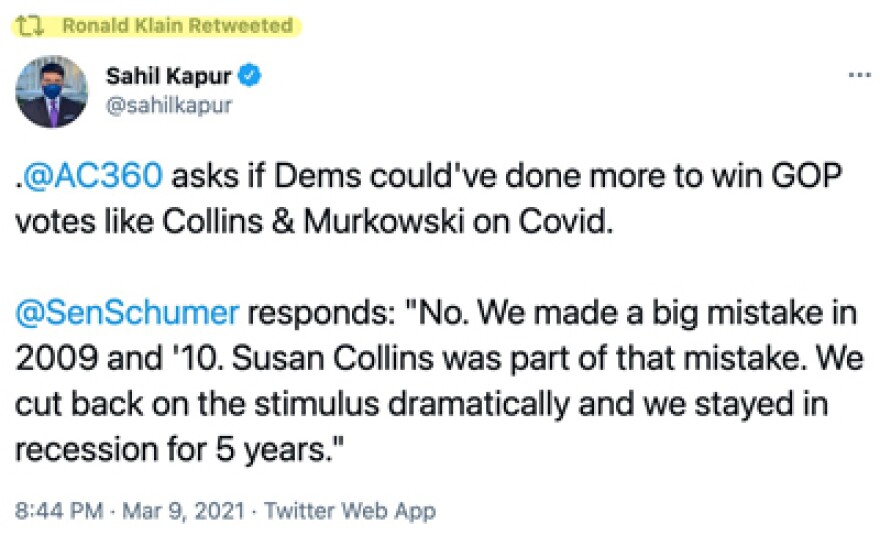The American Rescue Plan passed by Democrats in Congress and signed by President Joe Biden on Thursday is expected to deliver billions of dollars in aid to Maine in two slugs of funding that the state can use through 2024.
The first payment is expected within two months and possibly sooner. The injection of money will undoubtedly reshape the two-year budget proposed by Democratic Gov. Janet Mills.
In a statement released Wednesday, Mills indicated that she’ll submit changes to her budget proposal, while also seeking input from state lawmakers about how to spend one-time funds that could amount to $6 billion, according to an analysis by the Maine Center for Economic Policy, a liberal think tank.
“I look forward to working with the Legislature to make the wisest choices on using these one-time funds to do the greatest amount of good for the greatest number of people who have been affected by this pandemic,” Mills said in a prepared statement.
Overall, the stimulus plan will bolster state and local governments, unemployment benefits, housing and food assistance, small-business aid and education.
It includes direct payments to Mainers of $1,400. Individuals earning up to $75,000, or joint tax filers making up to $150,000, will qualify for the direct payments. Dependents in those households will also receive checks.
Unemployed Mainers will also receive an additional $300 per week, while those receiving food assistance could receive an additional $28 per person, per month.

Roughly $400 million will be directed at Maine schools to reopen for in-person learning, while $123 million will go to Maine higher education institutions and another $3.5 million will go to Head Start, a program initiated by President Lyndon Johnson that funds early childhood education for low-income children and families.
An estimated $1.6 billion will be directed to state and local governments, according to the House Committee on Oversight and Reform.
The money to state and local governments comes with some strings, according to an analysis by the National Conference of State Legislatures.
However, it would allow local governments to direct aid to assist small businesses, nonprofits and the hard-hit tourism and hospitality industries. States can also use the funds for infrastructure investments, including broadband expansion.
Republican U.S. Sen. Susan Collins voted against the bill, describing it as a Democratic wishlist cloaked in pandemic relief and “stuffed full of provisions that have nothing to do with fighting the coronavirus, from either a public health or economic perspective.”
Democratic U.S. Rep. Jared Golden also criticized the bill. He was the only Democrat in Congress to vote against it.
The stimulus bill was heralded by Democratic U.S. Rep. Chellie Pingree and independent U.S. Sen. Angus King, who described it as a measure that will provide pandemic relief and vaccine distribution while also turbocharging an economy hobbled by restrictions designed to curb the spread of the coronavirus.
Pingree described the American Rescue Plan as “one of the most important pieces of legislation Congress will ever pass.”
“Without significant action, the economic damage caused by COVID-19 will last well beyond the pandemic,” she said in a statement. “As someone who has long believed that government can and should be a force for good in our lives, I’m proud to have supported this legislation from the beginning. Maine families will feel lasting relief when this bill is signed into law by President Biden.”
Pingree’s assertion that the bill will demonstrate to the public that the government can help in difficult times will be tested in the coming months and years.
Just as they did during the Obama administration’s recovery plan for the Great Recession, Republicans are hoping that Biden’s first legislative victory will become increasingly unpopular as more is revealed about how the money is spent.
No love lost
Democratic Senate Majority Leader Chuck Schumer, of New York, did everything he could to knock off Republican Sen. Susan Collins last year.
Collins hasn’t forgotten. Neither has Schumer.
As Democrats made their final push to pass the Biden administration’s $1.9 trillion pandemic stimulus bill, Schumer was asked by CNN host Anderson Cooper whether Democrats should have made a bigger push to win the support of centrist Republicans like Collins.
Schumer on whether Dems should've tried harder to win over GOPers like Collins for COVID package: "No. We made a big mistake in 2009 and '10. Susan Collins was part of that mistake." pic.twitter.com/8kgeaOnbRr
— TPM Livewire (@TPMLiveWire) March 10, 2021
“No. We made a big mistake in 2009 and ’10. Susan Collins was part of that mistake,” Schumer responded. “We cut back on the stimulus dramatically and we stayed in recession for five years.”
Schumer’s remarks did not sit well with Collins, who essentially described the Senate’s top Democrat as a sore loser.
“For Chuck Schumer, who was intimately involved in the negotiations as the assistant leader, to somehow criticize me for taking the same position that he did, is simply bizarre,” she said, according to reporters on Capitol Hill. “And I think it reflects, regrettably, his inability to accept the fact that despite pouring $100 million into defeating me, the people of Maine said no, and reelected me to an historic fifth term.”
It’s not the first time Collins has taken a swipe at Schumer for trying to unseat her last year. On Inauguration Day, she accused Schumer for running a deceitful campaign against her and “blatant lies.”
“But nevertheless, I’m sure there are some issues where we agree and I’m not going to allow his disgraceful campaign tactics to interfere with my commitment to getting things done for the American people,” she said.
The Democrats’ campaign against Collins was extraordinarily negative, but so was the campaign against her challenger, former Maine House Speaker Sara Gideon. The National Republican Senatorial Committee repeatedly claimed Gideon had sheltered a former Democratic state lawmaker accused of sexual misconduct in order to maintain Democrats’ slim majority.
The hard feelings between Collins and Schumer add palace intrigue to failed efforts to come up with a bipartisan relief plan, but it doesn’t fully explain why Democrats went at it alone.
The counterproposal offered by Collins and several other Republicans was about a third of the Democrats’ proposed plan. Additionally, it was clear early on that the Biden administration was not interested in whittling the stimulus package to garner Republican support, because Democrats believe doing so during the 2009 recession ultimately prolonged the economic recovery, costing Democrats seats in Congress in the subsequent midterm elections.
President Biden’s chief of staff, Ronald Klain, appears to share that belief. He was among the 2,400 people who retweeted CNN’s interview with Schumer.

The Collins-Schumer kerfuffle isn’t the first time Maine’s senior senator has had a tense relationship with a Democratic majority leader. In 2014, Democrats had just a five-seat edge in the Senate, five votes short of the threshold needed to avoid the filibuster and close enough to prompt former Majority Leader Harry Reid, of Nevada, to court Collins and Sen. Lisa Murkowski, of Alaska. Collins and Reid had plenty of disagreements and several spilled into public view.
Schumer’s control of the Senate is significantly more narrow — a 50-50 split, with Vice President Kamala Harris serving as the tiebreaker. The chances of garnering Republican support for bills that need 60 votes are much slimmer for Schumer than they were for Reid, which means Schumer could be less inclined to try than Reid was.
Golden feels (more) heat
Golden drew fierce criticism for his initial vote against the stimulus bill. He drew more still when he was the only Democrat to oppose it during the final House vote.
Some of the blowback came from individuals and groups that previously held their fire. That includes the Maine AFL-CIO, a labor organization that called out Golden and Collins by name for opposing the proposal.
“We are very disappointed that Congressman Jared Golden and Senator Susan Collins chose not to support this pro-worker legislation,” Maine AFL-CIO president Cynthia Phinney said in a statement. “It is crystal clear that working people in Maine and across the country will be significantly better off under this new law.”
Golden has maintained that the stimulus bill spends too much at the wrong time. U.S. Rep. Kurt Schrader, D-Oregon, agreed when he joined Golden to vote against the bill during the initial vote. Schrader changed his mind and voted for the bill on final passage.
Tomorrow I will be voting in favor of the American Rescue Plan to provide targeted assistance across this country. My concerns remain on the size and scope of this bill but believe the Senate changes provide meaningful relief for Oregonians in need. (1/3)
— Rep. Kurt Schrader (@RepSchrader) March 8, 2021
Historic win
Craig Hickman, the adopted son of a Tuskegee airman, became the first Black person to serve in both chambers of the Maine Legislature when he cruised to decisive special election win in Senate District 14 on Tuesday.
Sen. Hickman, of Winthrop, defeated Republican Will Guerrette to fill the seat left vacant by Democrat Shenna Bellows. Bellows won reelection last year, but was not sworn in because she had been nominated by Democrats to become the first woman secretary of state.
Hickman’s win was not just historic, but also remarkably lopsided for a swing district that broke for former President Donald Trump in 2016, but narrowly went for President Biden last year. Democrats and Republicans have held the Senate seat, which includes southern and western parts of Kennebec County.
The contest also drew more than $200,000 in spending by outside groups, a significant amount to influence an election that has no impact on Democrats’ control of the Senate — although holding the seat could have implications for bills that require a supermajority (such as the two-year budget).
The effect of that spending, if any, is unclear. What is clear is that Hickman dominated. He won nine of 11 towns in the district and narrowly lost GOP-leaning West Gardiner.
Given all the attention by the two parties and the outside groups, there’s a temptation to look for additional meaning in Hickman’s win. Did Republican voters stay home because Trump wasn’t on the ballot? Are swing districts rejecting GOP candidates who align with Trump?
Those are reasonable questions, but the explanation for Hickman’s blowout victory could simply be that he’s a hardworking, affable and unique politician who happens to be a good fit for his district, just as Bellows was.
Click here to subscribe to Maine's Political Pulse Newsletter, sent to your inbox on Friday mornings.



